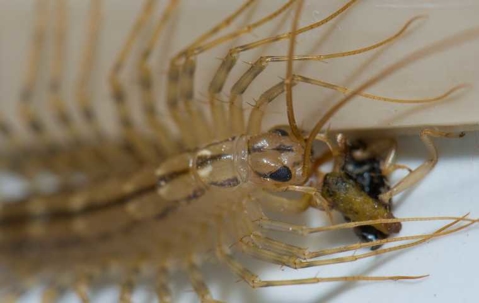House centipedes (Scutigera coleoptrata) are arthropods that primarily feed on various small insects and arthropods, making them beneficial in controlling household pests. They are skilled predators and have a varied diet, including:
- Insects: House centipedes prey on a wide range of small insects. They are particularly effective at catching and consuming these pests.
- Other Centipedes: They may even eat other small centipede species if they come across them, demonstrating their carnivorous nature.
- Silverfish: House centipedes will consume silverfish, which are common household pests known for damaging paper, clothing, and other items.
- Moths and Their Larvae: Centipedes will also prey on moth species, including their larvae, which can be a nuisance in homes, especially if they infest stored food items.
- Flies: House centipedes are agile hunters and can catch and consume small flies like fruit flies and house flies.
- Small Arachnids: House centipedes may feed on mites and other tiny arachnids.
House centipedes are known for their lightning-fast movements and impressive hunting skills. They use their venomous fangs to inject venom into their prey, which immobilizes and begins to digest the prey's soft tissues. House centipedes are a natural form of pest control and can help keep the population of other household pests in check.
Do House Centipedes Eat Spiders?
Yes, house centipedes do eat spiders. House centipedes are skilled predators and are known to hunt and feed on various small arthropods, including spiders. Spiders are a common part of their diet, and house centipedes are effective at catching and consuming them. This makes house centipedes beneficial in controlling the spider population in your home, as well as other household pests, given their carnivorous nature and excellent hunting abilities.
Do House Centipedes Eat Ants?
Yes, house centipedes do eat ants. House centipedes are voracious predators and have a diverse diet that includes various small insects and arthropods, including ants. They are effective at catching and consuming ants, which are a common household pest. House centipedes can be beneficial in controlling ant populations in your home, making them a natural form of pest control. Their agile and quick movements, along with their venomous fangs, enable them to hunt and feed on a wide range of small insects, including ants.
Do House Centipedes Eat Termites?
Yes, house centipedes are known to eat termites. Termites are small arthropods that can be destructive household pests, often causing damage to wooden structures. House centipedes, being carnivorous predators, include termites in their diet. They are effective at catching and consuming termites, making them beneficial for controlling termite populations in your home. House centipedes use their agility and venomous fangs to hunt and feed on various small insects and arthropods, and termites are among their potential prey. However, while house centipedes can help with termite control, they are not a complete solution for a severe termite infestation, and professional pest control measures may be necessary in such cases.
Do House Centipedes Eat Cockroaches?
Yes, house centipedes are known to eat cockroaches. Cockroaches are a common household pest, and house centipedes are natural predators with a diverse diet that includes various small insects and arthropods, including cockroaches. House centipedes are effective at catching and consuming cockroaches, which makes them beneficial for controlling cockroach populations in your home. Their agile and quick movements, along with their venomous fangs, enable them to hunt and feed on a wide range of small insects, including cockroaches. House centipedes are a form of natural pest control and can help reduce the presence of cockroaches in your living space.
Do House Centipedes Eat Bed Bugs?
Yes, house centipedes are known to eat bed bugs. Bed bugs are small, blood-feeding insects that can be a nuisance in homes. House centipedes are carnivorous predators with a diverse diet that includes various small insects and arthropods, and bed bugs are one of their potential prey. House centipedes are effective at catching and consuming bed bugs, making them beneficial for controlling bed bug populations in your home. Their agility and venomous fangs enable them to hunt and feed on a wide range of small pests, including bed bugs. However, it's essential to note that while house centipedes can help in reducing bed bug numbers, they may not be a comprehensive solution for a severe bed bug infestation, which often requires professional pest control measures.
Do House Centipedes Bite Humans?
House centipedes are capable of biting humans, but such bites are very rare and generally not dangerous. House centipedes have venomous fangs, or forcipules, located near the front of their body. While these fangs are primarily used to immobilize and subdue their prey, they can bite in self-defense if a person handles them roughly or accidentally traps them against their skin.
House centipede bites typically cause mild and temporary localized pain, similar to a bee sting, along with some redness and swelling at the site of the bite. The symptoms usually subside on their own within a few hours or days. Most people don't even realize they've been bitten by a house centipede because the bites are not often painful or bothersome.
House centipedes are more beneficial than harmful in a household since they help control other pests. If you encounter a house centipede, it's best to avoid handling or disturbing it to prevent any potential bites. Instead, let it go about its business of hunting and eating other household pests, as they can be valuable allies in pest control.
Learn more: Do House Centipedes Bite?

